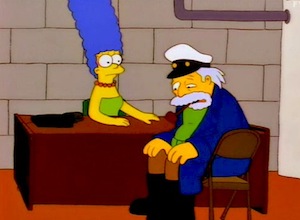The Sea Captain syndrome
The other day, after recounting the famous story that John Gardner tells about writer’s block in On Becoming a Novelist, I suggested that Gardner’s inability to figure out a small point of his story was really a reflection of deeper uncertainties. He sensed intuitively that he didn’t know the narrative or his characters well enough to move forward, so his mind seized on a tiny, seemingly trivial detail—the question of whether a certain woman would accept an hors d’oeuvre at a party—as a way of stalling the process, thus buying himself an extra week for unconscious reflection. The hors d’oeuvre didn’t matter in itself; it was only the excuse he needed for a necessary break. And this strikes me as being more generally true of writer’s block itself. I’ve talked about writer’s block here before, noting that the best way of dealing with it is by establishing a routine that fools the creative faculty into thinking that something useful is taking place, even if it isn’t. But it may be more accurate to think of writer’s block less as an impersonal scourge than as a condition tied inextricably to the conditions of writing itself, just as an illness can emerge from a breakdown in the body’s homeostasis.
What I’m proposing is that there are two opposing forces that play a role in any creative artist’s life: the urge to produce and the urge to postpone. Both sides are essential, and at their best, they work together. If we didn’t feel driven to get something down on paper, even on our worst days, we wouldn’t do much of anything at all: half of writing consists of meeting quotas or cranking out words when we’d rather be doing anything else. Left to itself, though, that inclination can lead to shoddy work, or, worse, a kind of deception that the writer imposes on both the reader and himself, as fake insight or emotion stands in for the real thing. Hence the importance of postponement—the ability to know when to pull back, or to wait for the second good idea. It’s a principle that governs everything from Walter Murch’s admonition that an artist should leave “a residue of unresolved problems for the next stage” to David Weinberger’s simpler motto “Include and postpone.” David Mamet notes somewhere that the first thing that occurs to the writer is often the first thing that occurs to the audience, too, so an author needs an internal mechanism in place that prevents him from going with a convenient idea simply because it exists.
Under ideal circumstances, these two impulses exist in harmony, pushing against each other so that the writer oscillates between extremes of productivity and idleness. Average them out, and you’ve got a decent writing life. If either tendency starts to take control, however, it can cause real problems. We all know how it feels when the urge to postpone consumes everything else: we spend more time on research, or we suddenly feel the urgent need to reply to a few old emails, and it can leave us paralyzed with inactivity. Yet the urge to produce can be even more dangerous, precisely because it’s so seductive. I’m a pretty good writer; I’ve trained myself to crank out five hundred words in an hour on just about any subject, and I don’t lack for ideas for long. But when I look back at some of my old work, I can see that this kind of facility can be a trap in itself. Whenever I get notes on a draft, for instance, I immediately come up with five different ways of addressing each problem, but just because the answers come easily doesn’t mean they’re correct. And there are times when I’ve realized, in retrospect, that I would have been better off rejecting the first ideas that presented themselves and waiting for something better to come along.
That’s the greatest danger of writer’s block: it’s so painful that we’ll do anything we can to avoid it, even if it means falling into the opposite extreme. I sometimes think of it as Sea Captain syndrome, named after an exchange involving Captain McCallister on The Simpsons, as he presents a proposal to Mr. Burns:
McCallister: “I’ll need three ships and fifty stout men. We’ll sail ’round the Horn and return with spices and silk the lives of which ye have never seen.”
Mr. Burns (angrily): “We’re building a casino!”
McCallister: “Arrr…Can you give me five minutes?”
I’ve spent much of my writing life coming up with five-minute solutions to problems that really should have taken five days—or five weeks—to solve, and it’s been a liability as much as a strength. The healthier approach, which I’m still trying to master, is to regard productivity and postponement as complementary states, the warp and woof out of which the writing life is made. The former feels a lot better than the latter when you’re in the middle of it, but like all artificial highs, you pay for it in the end. Better, perhaps, to see writer’s block, rightly, as a necessary condition to creativity, even if it leaves us saying, as the Sea Captain does elsewhere: “Yarr…I don’t know what I’m doing.”



Leave a comment